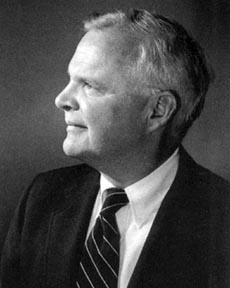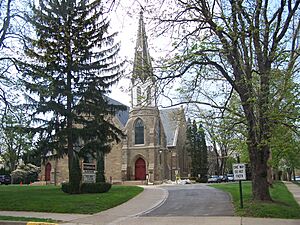Joseph Willcox Jenkins facts for kids
Quick facts for kids
Joseph Willcox Jenkins
|
|
|---|---|
 |
|
| Born | 15 February 1928 |
| Died | 31 January 2014 (aged 85) Lawrenceville, Pittsburgh, Pennsylvania
|
| Education | Ph.D., Catholic University M.M., Eastman School of Music, 1951 B.M., Eastman School of Music, 1950 B.S., St. Joseph's College |
| Occupation | Composer, professor, conductor, musician |
| Employer | Duquesne University |
Joseph Willcox Jenkins (born February 15, 1928 – died January 31, 2014) was an American composer, music teacher, and musician. He wrote over 200 pieces of music.
During the Korean War, he became the first person to arrange music for the United States Army Chorus. An arranger takes existing music and changes it for different instruments or voices. He taught music for many years at the Mary Pappert School of Music at Duquesne University. He started teaching there in 1961 and later became a Professor Emeritus, which means he was a respected retired professor.
Contents
Joseph Jenkins' Early Life and Army Days
Joseph Jenkins started piano lessons when he was only six years old. Soon after, he began writing his own small songs in elementary school. In high school, he created many arrangements and original pieces for orchestras.
In 1946, Jenkins began college at Saint Joseph's University in Philadelphia. He first studied to become a lawyer. At the same time, he also learned about composing music from Vincent Persichetti. Jenkins finished his degree in three years.
He then went to the Eastman School of Music in 1949. There, he studied with famous composers like Thomas Canning and Howard Hanson. Jenkins earned his master's degree in music in 1951. This was during the Korean War. He was then drafted into the Army and sent to Fort George G. Meade in Maryland.
While in the Army, Jenkins was an arranger for The United States Army Field Band. He also worked for the American Forces Network, which broadcast to soldiers. During this time, he wrote his very famous piece, "American Overture for Band, Op. 13."
A special 50th anniversary version of "American Overture for Band" was released in 2004. Jenkins worked with the publisher to update the music. He made changes to how loud or soft the music should be and how the notes should be played. "American Overture" became his most successful work. He once said it would be hard to create another piece as popular.
Teaching Music and Rejoining the Army
In 1953, Jenkins taught for a short time at Catholic University. He was filling in for a professor who was on a break. He liked the university so much that he decided to get his doctorate degree there. He used money from the G.I. Bill, which helps veterans pay for college. He studied with William L. Graves and Conrad Bernier, who greatly influenced his career.
In 1956, Jenkins joined the military again. He became the main arranger and assistant conductor for the United States Army Chorus. This group was formed that same year. He was their very first arranger. The Army Chorus is a top male singing group, like a vocal version of the Army Band.
Jenkins wrote over 270 arrangements for voices while with the Army Chorus. He also wrote several new pieces. He is well-known for his vocal arrangements of popular songs by Stephen Foster. These include "Beautiful Dreamer," "Camptown Races," and "Oh! Susanna." These arrangements are still a key part of the Army Chorus's performances today.
In 1961, Jenkins started teaching as a full professor at the Mary Pappert School of Music at Duquesne University. He taught music theory, how to arrange music for orchestras, and composition. His students and fellow musicians loved him. He also led the Theory and Composition Department at the university's School of Music.

Many of his collected choral works are kept at Gumberg Library's Music Library Resources. A former director of the U.S. Army Orchestra and Chorus, LTC John Clanton, said that Jenkins truly understood how to write for male choirs. He called him "one of only a handful of composers and arrangers in the entire world" with this skill.
Besides teaching at the university, Jenkins also taught younger students. He was an organist and music teacher at St. Edmund's Academy in Pittsburgh. He also wrote music for the orchestra at The Ellis School, another school in Pittsburgh. He composed pieces for other schools too, like Holy Innocents High School and the Marlborough School in Los Angeles.
Outside of schools, Jenkins played the organ and led choirs at several churches. These included Sewickley Presbyterian Church in Sewickley, Pennsylvania, St. Bernard Catholic Church in Mt. Lebanon, Pennsylvania, and Rodef Shalom Congregation in Pittsburgh.
Awards and Honors
Joseph Jenkins received many awards for his musical talents:
- Ford Foundation fellowship (1959): This allowed him to be a composer-in-residence at Evanston Township High School in Illinois.
- Sousa/Ostwald Award: For his piece "Cumberland Gap Overture" in 1961.
- ASCAP: He won thirty awards from ASCAP, one every year from 1960 to 1990.
- Omicron Delta Kappa Teacher of the Year Award (2000).
- American Bandmasters Association Award (around 2007).
Joseph Jenkins' Music
Here are some of the types of music Joseph Jenkins composed:
Music for Orchestra
- 1973 Sinfonia de la Frontera
- Two symphonies
- 1997 "American Overture" (this was originally for band, then changed for orchestra)
Music for Bands
- 1955 An American Overture, op. 13
- 1959 Charles County Overture
- 1961 Cumberland Gap
- 1969 Cuernavaca
- 1975 Symphonic Jubilee
- 1977 In Traskwood Country
- 1978 Tartan Suite
- 1978 Toccata, op. 104
- 1954 Pieces Of Eight
- 1995 Credimus
- Arioso
- Cannonade (Concert March)
- Concerto for euphonium and band
- Gateway West
- Prelude
- Romanza
- Hoedown
- Purcell Portraits
- Three Images
Sacred Music
- 1999 Psalm 100, for mixed choir, op. 191
- 1999 Ave Maria (Hommage a Josquin), for chamber choir, op. 192
- 2001 Requiem, for mixed choir and orchestra, op. 198
- Joy to the World, for mixed choir, trumpets, trombones, horns, timpani and organ
- Cantate Hodie (Sing Forth This Day), a cantata (a piece for voices and instruments) for soprano, mixed choir, brass, and organ, op. 197
- Good Christian men, rejoice
- In dulci jubilo
- The Rocking Carol
- Bring your torches
- A la nanita nana
- I saw three ships
- O little town of Bethlehem
- Kolyada
Music for Choirs
- 1997 Six Carols for Westerly, for mixed choir, op. 183
- 1997 Six American Folk Tunes, for mixed choir and brass band, op. 185
- 1997 Etz Chayim, for mixed choir, op. 186
- 1999 Vitis Mysticum, for mixed choir and orchestra, op. 193
- Hail Thee, Festival Day, based on Salve festa dies, for mixed choir, trumpets, trombones, timpani and organ
- Heartland, for children's choir and brass band
- Dan Tucker
- Crockett County
- I Shall Not Live in Vain – words by Emily Dickinson
- Street Parade
- An Indian Summer on the Prairie – words by Vachel Lindsay
- The Prairie – words by William Cullen Bryant
Vocal Music
- 1959 The Minstrel Boy, for tenor solo, male quartet and choir – words by Thomas Moore
- 1966 Czech Lullaby Carol, for voice, winds, strings and piano
Chamber Music
Chamber music is written for a small group of instruments, usually one player per part.
- 1950 Sonata No. 1 (in One Movement) in D minor for viola and piano, Op. 7
- 2002 Sonata da Chiesa for viola d'amore and organ, op. 200
- 2012 Sydney: A Feline Capriccio, op. 217
- Two string quartets
Music for Organ
- 1951 Toccata
- 1966 Six Pieces for Organ
- Upon an Old English Hymn Tune
- Arioso
- Sonata
- Adagio in Phrygian Modes
- Rondeau
- Deo Gracias
- 1968 Fancy and Ayre
- 1999 Confluence
- Thin Small Voice, a biblical symphonic poem
Music for Percussion
- Bits and Pieces, for Timpani and Piano
 | Georgia Louise Harris Brown |
 | Julian Abele |
 | Norma Merrick Sklarek |
 | William Sidney Pittman |

